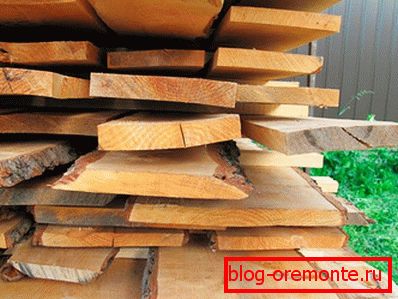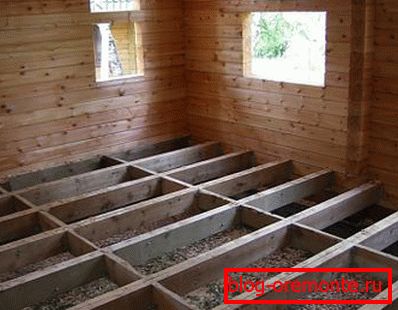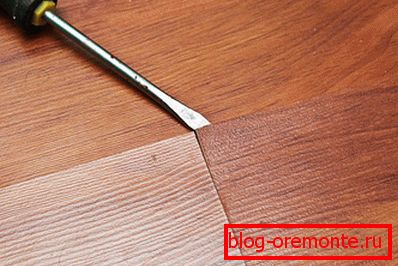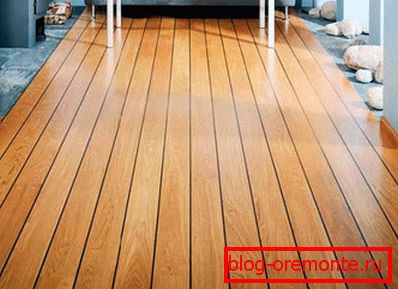Why does the floor creak in the apartment
If you are annoyed by creaking under your feet, do not postpone the elimination of this trouble until later, as the creaking will subsequently increase. To get started, find out why the floor is creaking in the apartment.
Why the creak appears

Creaking is sound. And it appears because the two wooden elements of the floor rub against each other.
Of course, ideally, none of the elements of the floor (neither the flooring, nor the subfloor, nor the lag, if they exist) should “walk”. But since almost all of these parts of the floor are made of wood, to avoid squeaking, sooner or later, almost no floor covering in an apartment or house can be avoided.
Note! Although wood is a natural material that is safe for human health, it is susceptible to deformation. If you look into the structure of wood, we will find water molecules there (it is their number that determines the moisture content of the tree). If the water molecules becomes a lot - the wood swells, a little - dries out.
The same process occurs in the wooden elements of the floor, which is affected by the change in humidity in the room. Water molecules are absorbed into the wood from the air or, on the contrary, leave it. And gradually the wooden elements that were tightly attached to each other begin to “walk” relative to each other. At that moment, when they rub together, and there is a creak.
Causes of wood floor squeak
There are several reasons for the squeaking of wooden flooring in the apartment. Consider some options for the occurrence of such noise.
Creaks floor on logs

This is the most common case of squeak. And the reasons why the wooden floor squeaks are pretty simple. It creaks due to the fact that the floor construction on logs has quite a few wooden elements in contact with each other, as well as an air gap between them.
If you look at the design of the floor on the logs, then you can select the most squeaky places:
- boards (wooden flooring) in the places of their support on logs;
- places of contact of boards with each other.
Both lags and boards laid on them can be deformed under the influence of excessive or insufficient humidity. In addition, over time, fastener joints weaken as well (boards are attached to logs with nails).
If you lay linoleum or laminated backing on top of the boards, it will not save you from squeaking. Therefore, if you began to creak the floor on the logs, most likely you will have to completely disassemble it and replace it with a new one.
Creaks floor on a solid foundation

Here, it would seem, laid the parquet on the glue on the concrete screed and no creak will ever disturb you. But in fact, everything is not so. Why does the wooden floor creak in this case?
To answer this question, you will have to delve a little bit into the technology of laying parquet. Parquet is a construction of individual wooden elements. And each of these elements (the parquet plank) can absolutely independently swell or shrink a little. At the same time, the parquet slats do not prevent them from changing their geometrical dimensions at all because they are glued to the base or are attached with nails:
- in the first case, the plank that has increased in size begins to hit the sides with its “neighbors”, making creaking sounds;
- in the second case, the reduced (at least by 1 mm) wooden plank first “falls out” of the groove a little, and then, when the humidity in the room increases, it simply cannot return to its original position, resting on the adjacent planks and starting to squeak.
Causes squeak laminate

Well, why the laminate squeaks in the apartment, because the slats are not boards?
In fact, the laminate is made of wood-containing material - from a fiberboard, which "inherited" the ability to swell and shrink from its "parent". And if the heat and low humidity between the individual elements of the floor of the laminate appear cracks, then with high humidity laminate strips literally "fit" on each other, starting to creak.
Take or not take

After reading about the "inevitable" reasons for the emergence of creaking, you may want to refuse such squeaky material, but do not rush to do it. If extreme situations do not arise in your home, and you are not going to create them, then make such a floor as you have in mind. It is not out of place to know that there is no perfect floor covering and each floor has its own drawbacks, after reading which you will be able to choose what suits you best.
Video
This video tells you what to do if the floor squeaks: